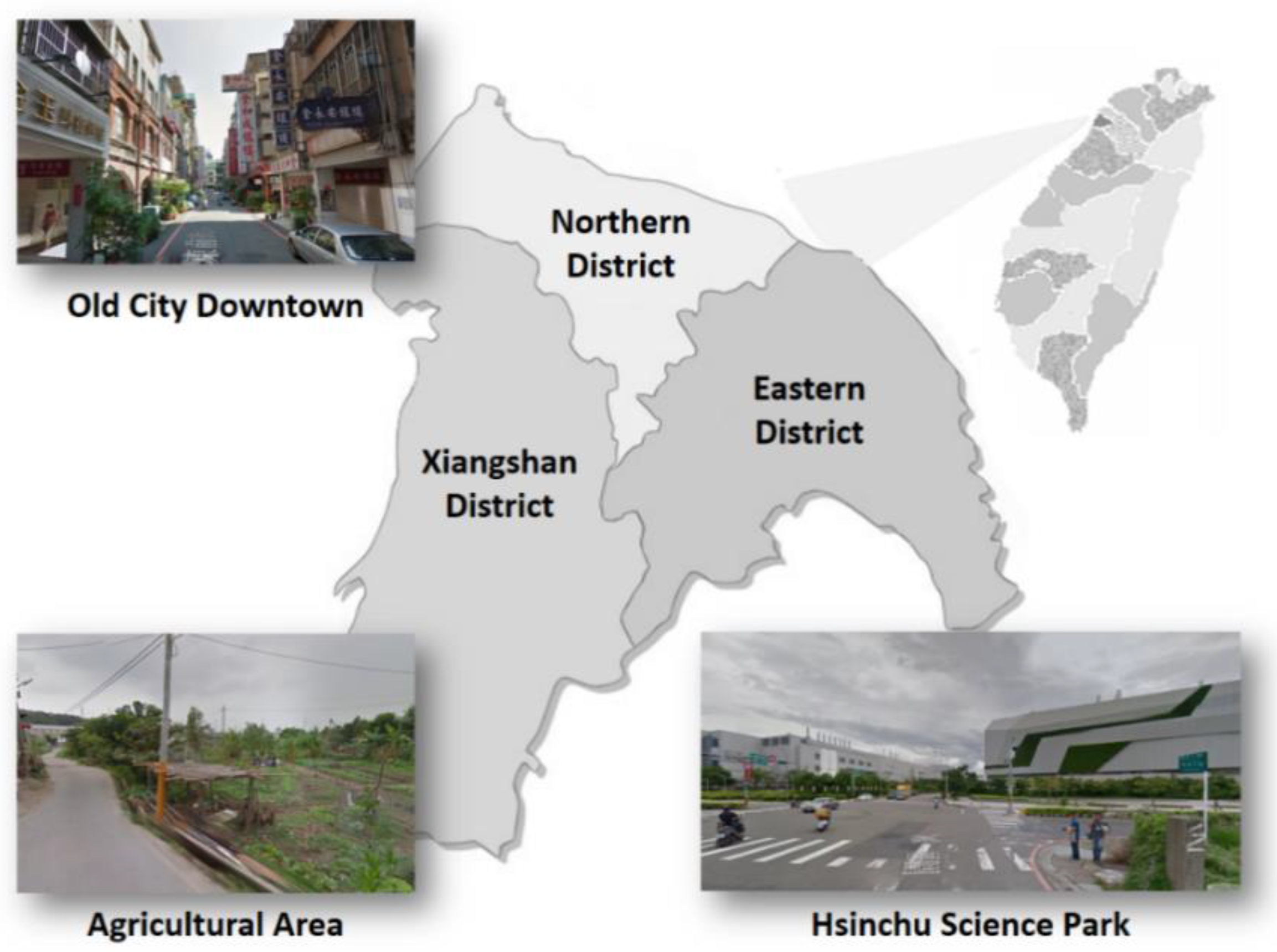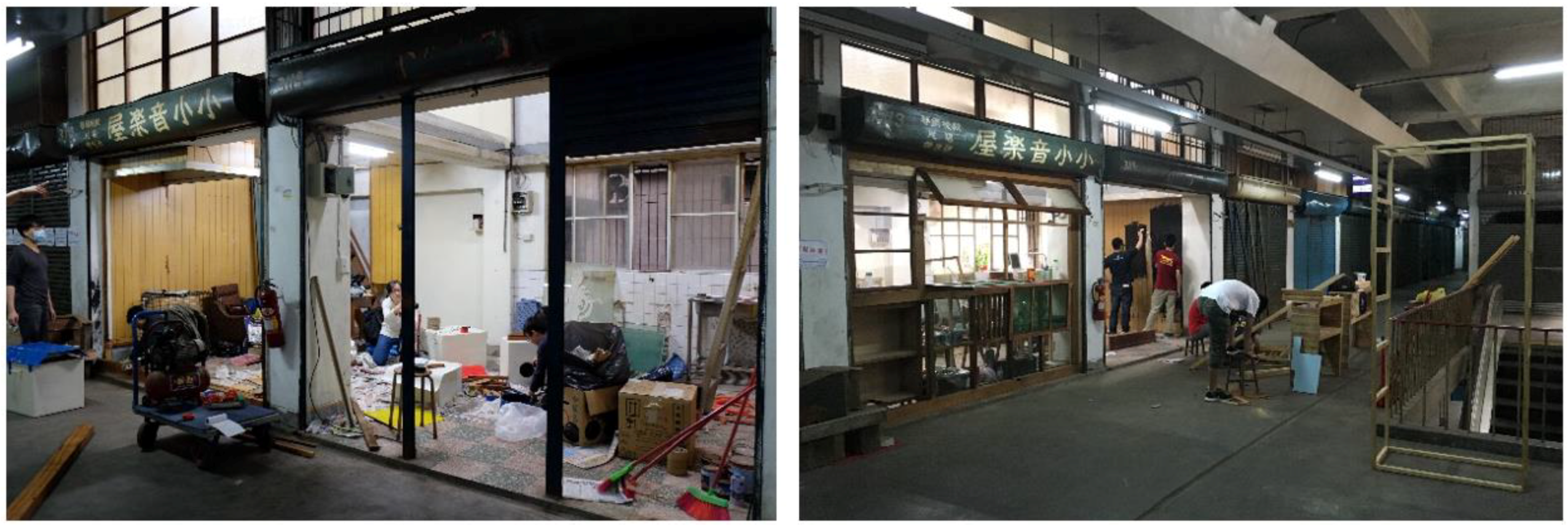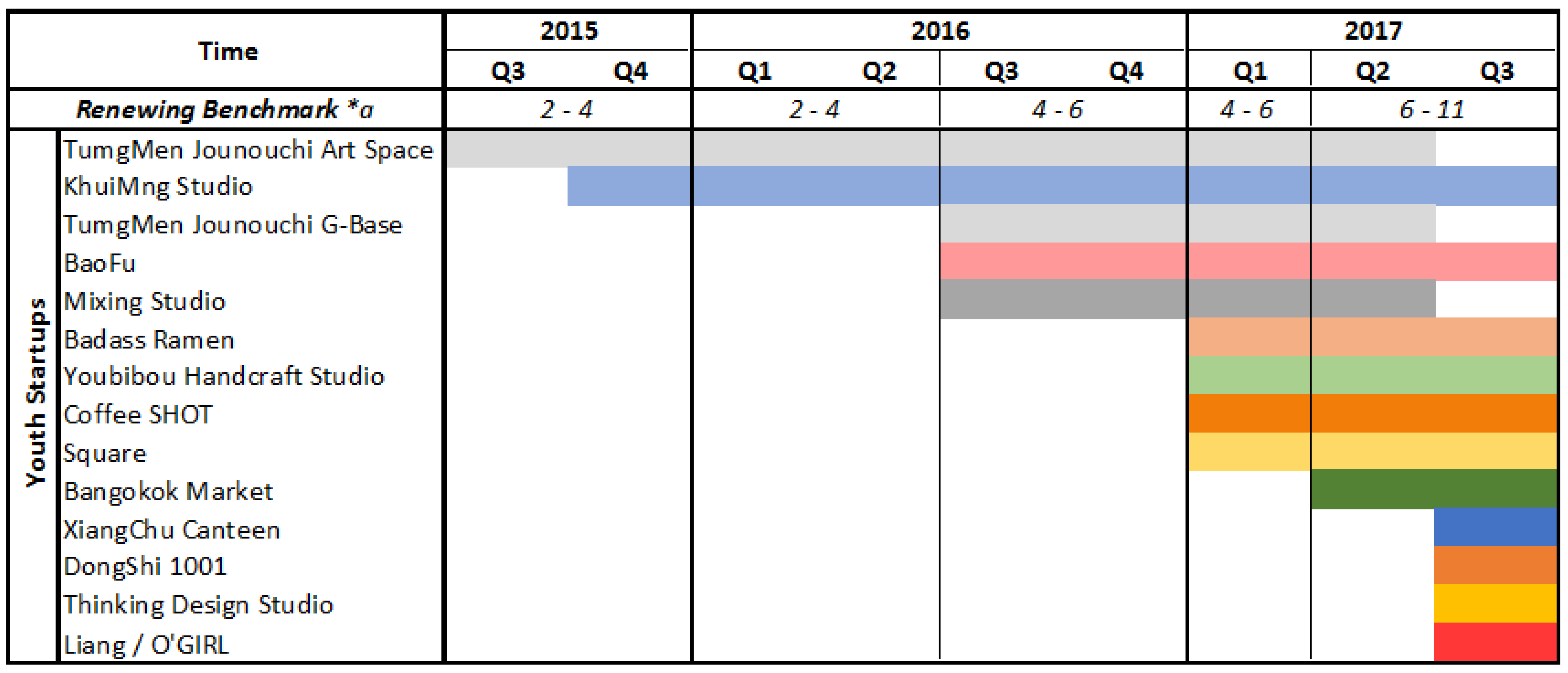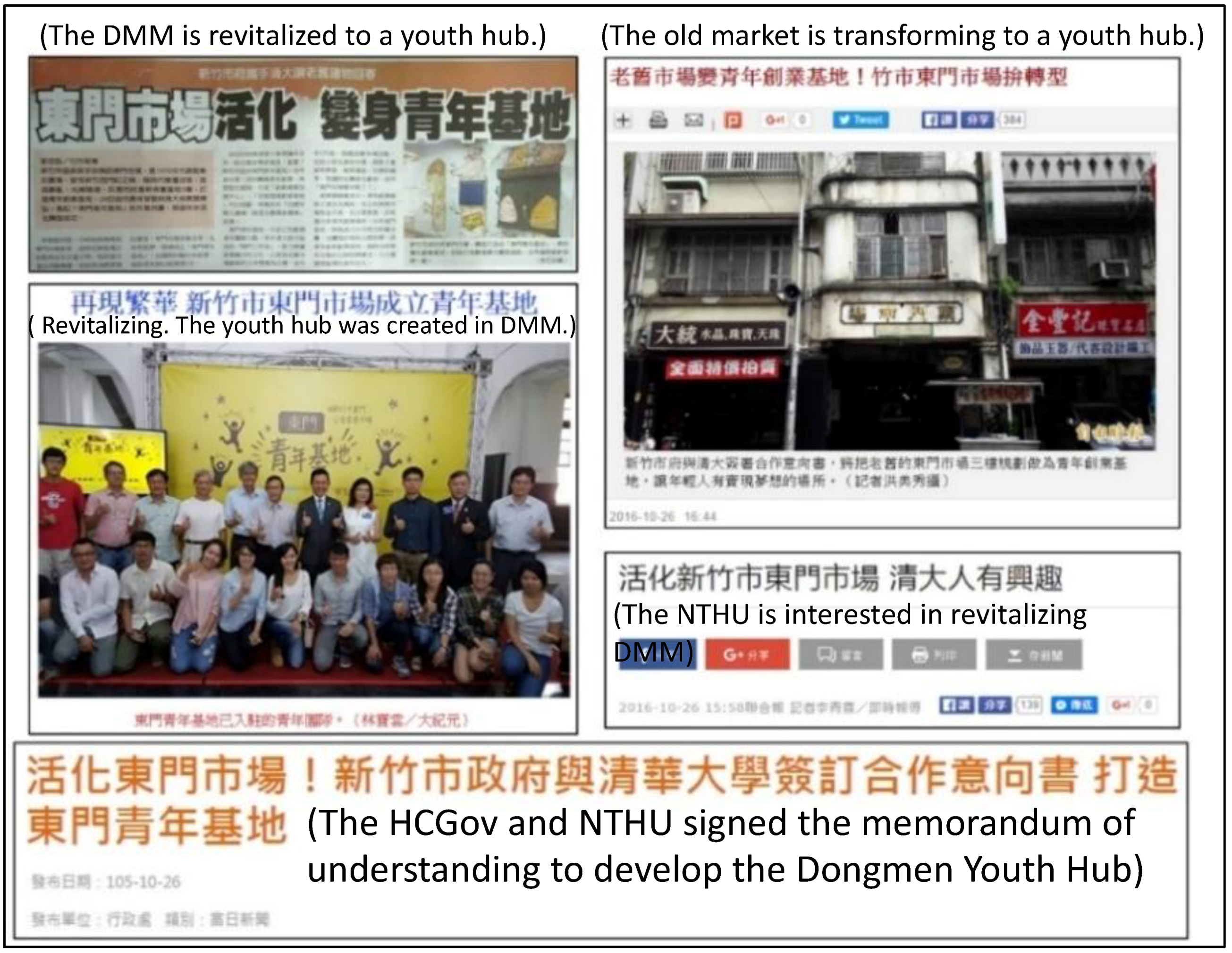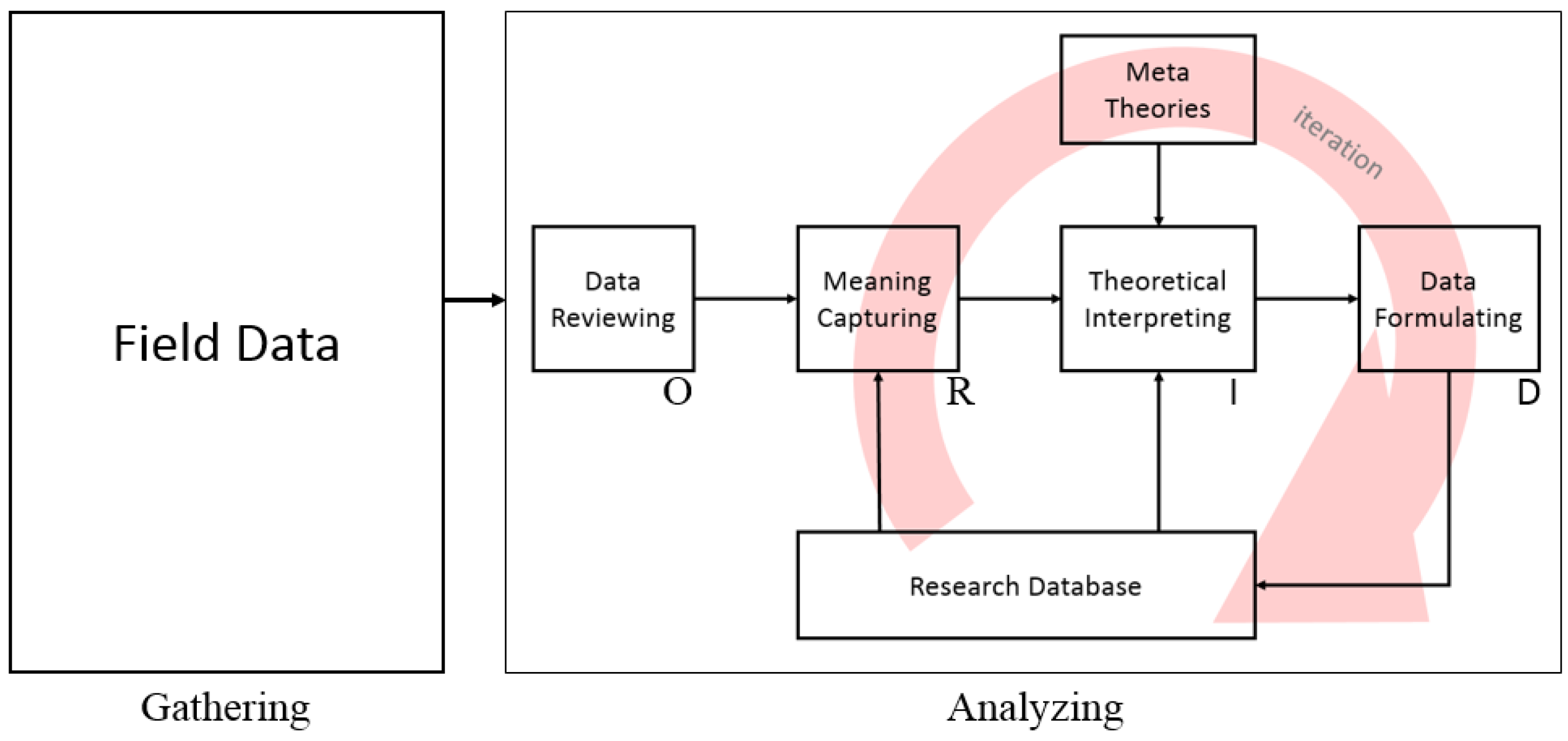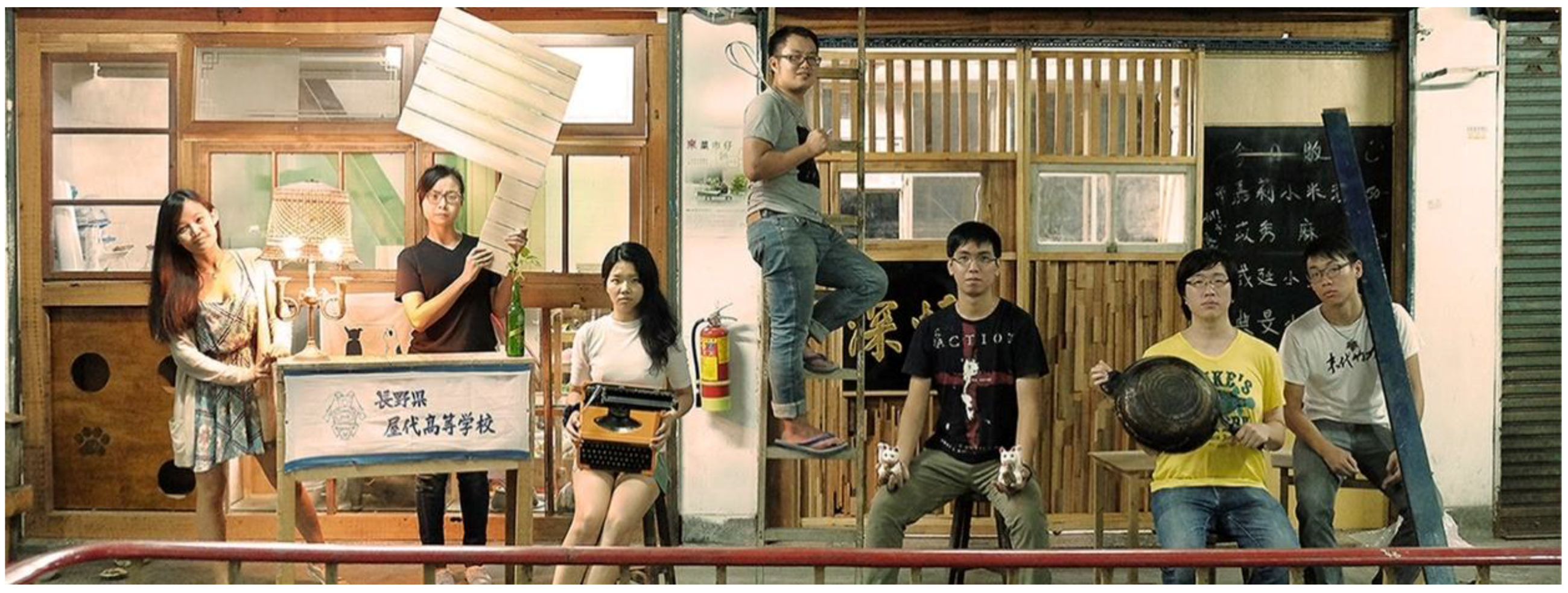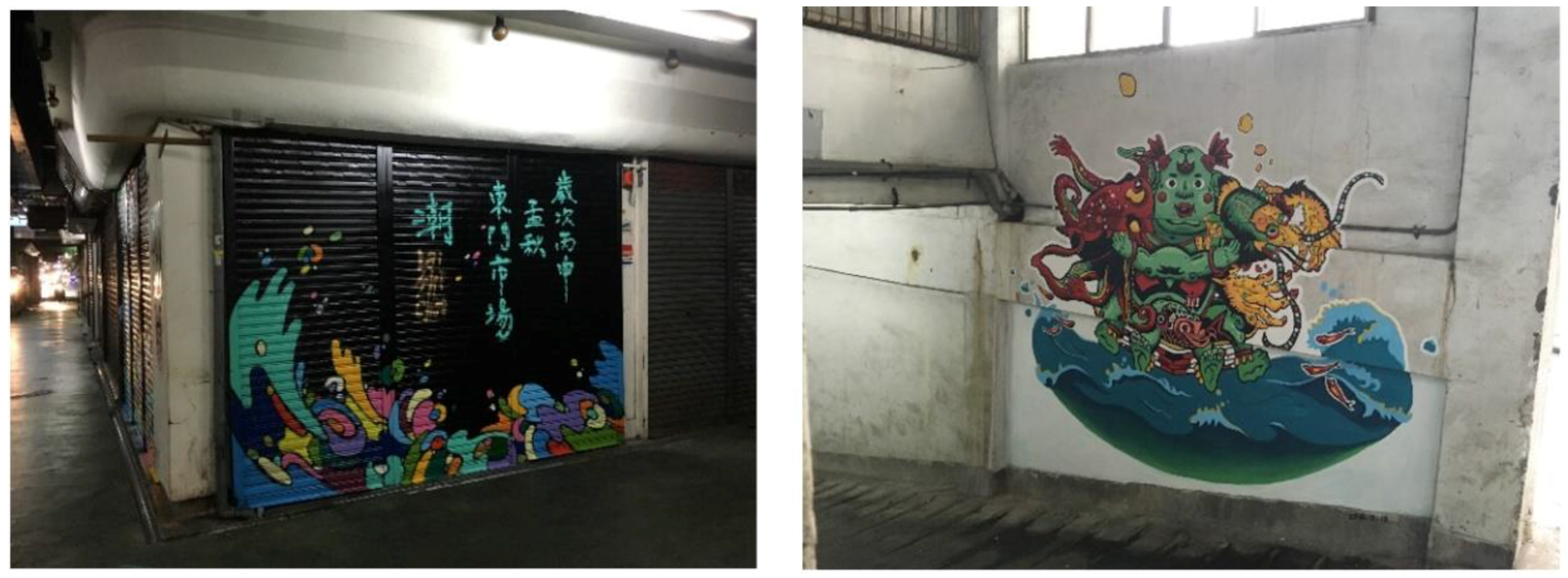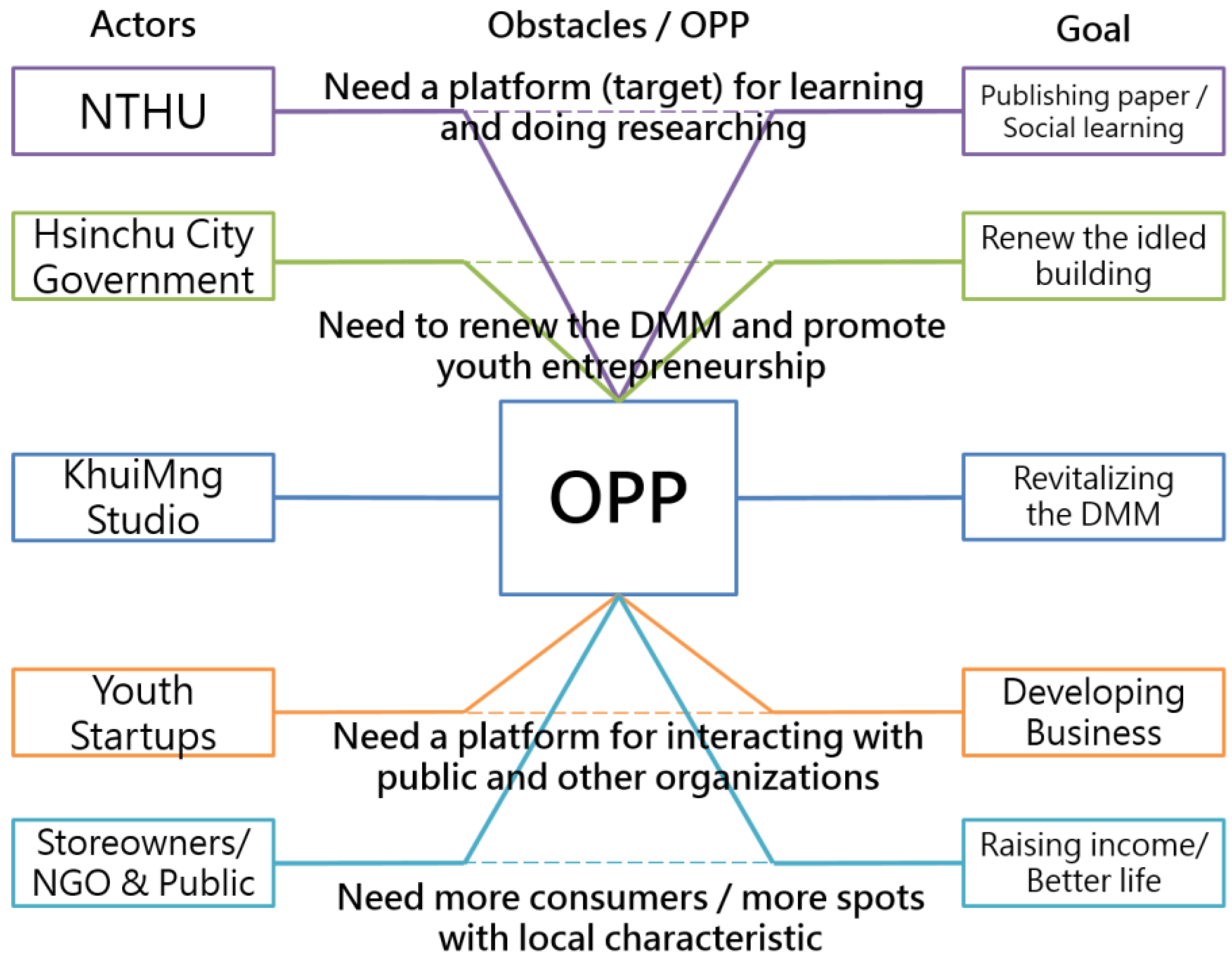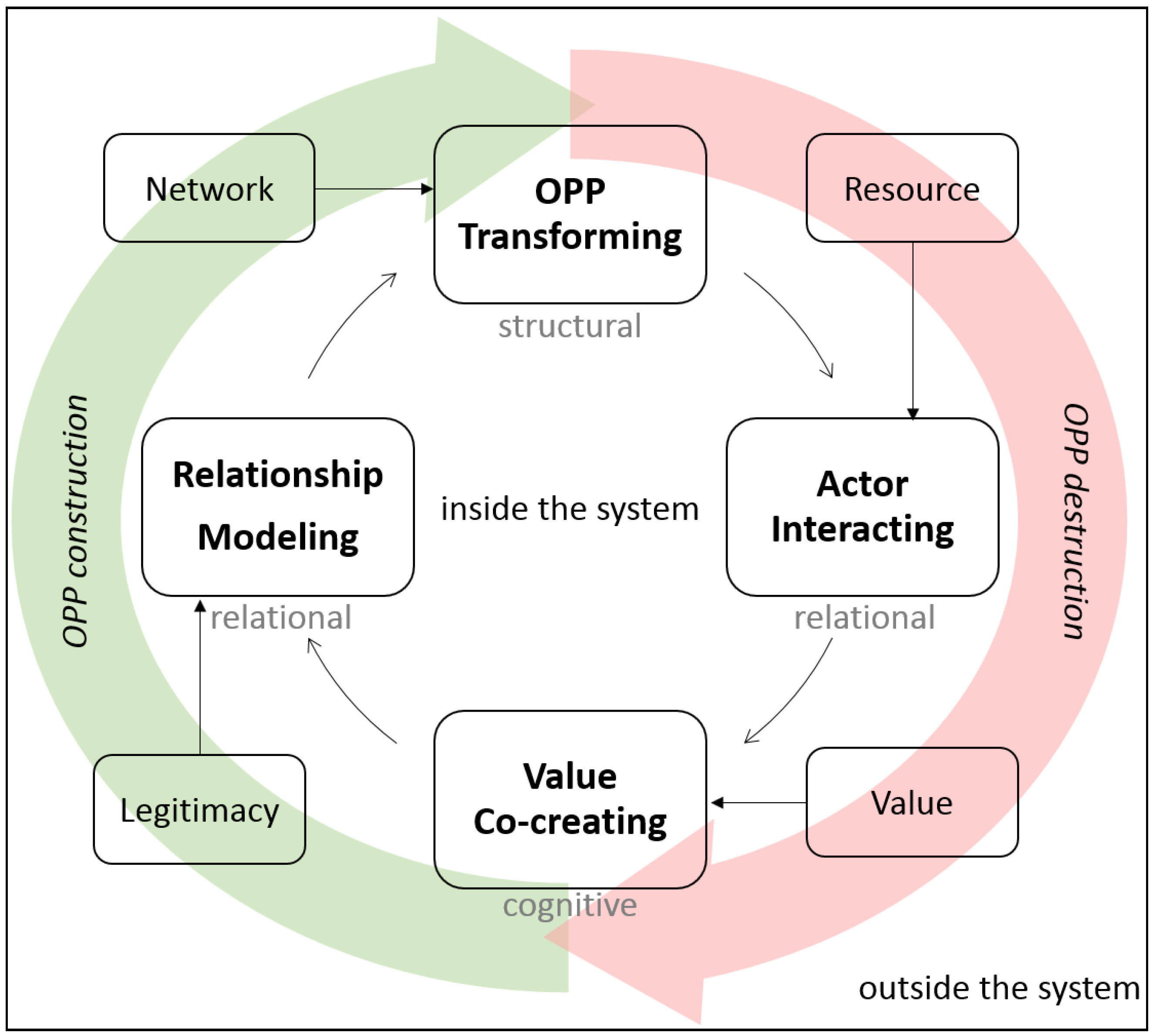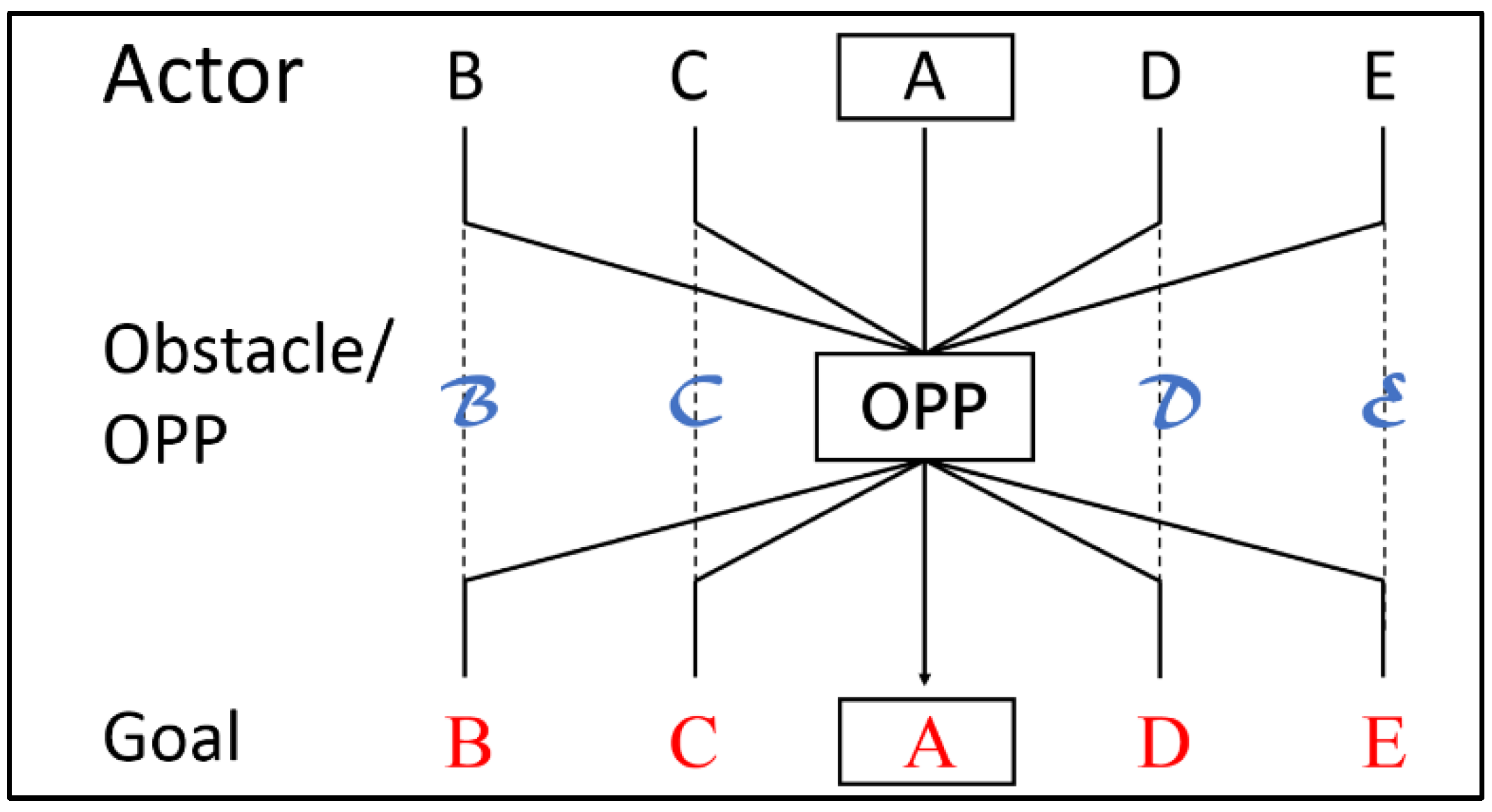1. Introduction
With the global trend of urbanization and the increase of cities and the size of urban areas, more than half the world’s population lives in cities, which reallocate social, economic, and environmental capital. Meanwhile, with the shifting of capital, a city itself may face issues of abandoning existing economic bases and losing traditional cultures [
1,
2]. It is crucial for a city to sustain itself socially, economically, and environmentally while emerging in the front wave of urbanization [
3]. From the literature reviewed, the City Sustainability Index (CSI) was used to qualify sustainability in environmental, economic, and social dimensions [
4,
5,
6]. The role of public participation and engagement is highlighted for its efforts in sustaining cities. Instead of the traditional “top-down” city policy, many studies have suggested that local stakeholders should be involved in the planning and operating processes for city development [
7,
8].
Viewing a city as an integration of various service systems through the lens of Service-Dominant Logic (S-DL), how to sustain the system development by doing open innovation involved other stakeholders becomes an important issue. Under the S-DL perspectives, we treat stakeholders (e.g., government, universities, industries, non-governmental organizations (NGOs), and civilians) as social and economic actors who also act as resource integrators [
9]. For example, universities are now included as actors that contribute to fulfilling the indicators of CSI [
4] and are believed to have an obligation to address economic, social, and environmental challenges and then to participate in solving the problems that affect the sustainability of the cities where they are located [
10]. University Social Responsibility (USR) has gradually become an international movement for universities; one that aims to tackle specific social challenges under urbanization and globalization via community engagement in which scientific and social research and development could be assessed by the aforementioned CSI dimensions [
11,
12].
To develop a sustainable city, stakeholders involved in service systems must be interdependent [
7,
13]. This research uses Service-Dominant Logic (S-DL) and Actor Network Theory (ANT) [
14] perspectives to study the development of new city service systems through interventions by USR projects. In this paper, a USR project, the Cross-Border Governance and Civic Culture Innovation Project (CBGP) called for the participation of stakeholders with various degrees of power, legitimacy, and urgency [
15] to revitalize a declining traditional market, Dongmen Market (DMM), in Hsinchu, Taiwan. We view the revitalization as an open innovation process that enables stakeholders to propose and receive value in corresponding service systems. We conducted a two-year ethnographic study to identify the mechanisms and insights of the innovated service system.
Because of the economic and social changes caused by urbanization and globalization, residents of certain cities were forced to move away from these cities, which led to urban shrinkage and diminished economic and social vitality [
1,
16]. Traditional markets (indoor and outdoor) were affected by the advent of convenient stores and modern outlets, which utilized retailing technologies, and faced the pressures of urban renewal, which may result in the negative effects of gentrification [
17,
18,
19]. To tackle the aforementioned global challenges under urbanization, we view DMM, a traditional market, as a service system formed by stakeholders involved in ecosystems of Hsinchu City. Obligatory Passage Points (OPPs) form in an actor network comprising stakeholders seeking their own goals [
14,
20]. Via S-DL, an actor network can be treated as a service system that has value propositions offered by the participant actors who co-create value [
21]. Through the formation of an actor network, OPPs can be seen to deliver the aforementioned value propositions in an evolving system.
The viewpoint of sustaining urban service systems with the evolution of OPPs has not been seen in prior research in related disciplines. Prior research has only viewed OPPs based on their original features of ANT to demonstrate the network analysis results using a cross-sectional design [
22,
23,
24,
25], for example, using an OPP to view the role of humans in the Internet of Things (IoT) (for information systems such as the OPP, see [
26]) or contemporary open service systems for traditional industries or redesigning communities [
27,
28]. Results of prior research show excellent effect on the performance of system analysis, which are able to demonstrate the system formation and actors’ interaction in a structural way for further study.
With the advantage of S-DL, the mechanism that affects the evolution of OPPs could be clarified to explain how value is co-created along with the development of sustainable service systems to form a productive ecosystem through open innovation processes. The value created in these processes lies in the social dimension in which stakeholders demonstrate their social impact on sustaining societies. According to cognition-oriented outcomes, such as feeling and understanding [
29,
30,
31,
32], social capital is used to describe the relational resources and assess the development of social organizations or networks [
33].
In this research, a framework is proposed to trace the practices of open innovation that drive the evolution of OPPs in creating potential significance in sustaining service systems, in which OPPs offer value propositions while also engaging communities [
34]. Evidence from the field study was captured to demonstrate the value co-creation in the open innovation practices for revitalizing the traditional market, DMM. A table with the acronyms was created to support their use in the large research scale with multidisciplinary stakeholders (
Appendix A).
2. Case Study: Revitalization of Dongmen Market
Hsinchu, the first city in northern Taiwan, built in 1732, is now famous for its semiconductor industry located in Hsinchu Science Park, which was developed around 1980. According to government open data, there were over 150,000 employees working in the Science Park in 2016, which accounted for 35% of the city’s population. Household income in Hsinchu city was ranked second among cities and counties in Taiwan [
35]; however, due to the unbalanced development of the city, the living standards of the old downtown area (northern district) and agricultural area (Xiangshan district) have declined considerably in the past few decades compared with the rapid economic growth of Science Park (eastern district) (
Figure 1).
Dongmen Market (DMM), located in the center of Hsinchu City, was the largest market in Taiwan in the 1900s (
Figure 2). Being the most important trading port in north Taiwan, DMM played an important role in the city’s history until it was gradually deserted in tandem with the development of Science Park. Because of its large floor area (over 9000 m
2) and high vacancy rate (over 60% in 2015,
Figure 2), the Hsinchu government (HCGov) has been collaborating with National Tsing Hua University (NTHU) through the CBGP to plan a subproject to reform this old market and turn it into a youth hub. The CBGP team considers this traditional market a reflection of an urban service ecosystem in the social and economic dimensions. Thus, DMM revitalization means sustaining the urban service system by re-connecting its declining social and economic functions with city life. Therefore, a project team, KhuiMng Studio (KMS), was founded by multidisciplinary members (KMSer) from local universities and began by engaging DMM stakeholders.
Because of sensitive political issues and the impact of globalization on local industries, almost no new stores opened from the 1980s to 2016 in DMM. The official report showed that only 215 of 571 stores were rented in January 2015. However, over half of these rented stores were used as warehouses or even left empty. The first impression of DMM by visitors elicits reactions such as “
dirty, dark, and scary because of the closed rolling steel doors” (
Figure 2). The lack of consumers also creates impressions such as “
dangerous, corrupt, and abandoned.” Nearly no one thought this market would have the chance to be revitalized, especially given the failure of reconstruction after field research by a construction company in 2013. Field data showed that store owners thought “
students just came to do their homework again”, when KMSers began fieldwork at the beginning of the CBGP, indicating they were xenophobic to “
outsiders”.
Trust between outsiders and several store owners was gradually established over six months after the intervention because store owners found that some students had rented their own store spaces in DMM. Recognizing the newly installed students as “insiders”, store owners revealed to the academics that they were xenophobic because all of the resources (e.g., budget, professors, students, and activities) that remained after the various projects had been exhausted. This phenomenon made them feel like they were “
being taken advantage of to finish unrelated business”, which harmed not only themselves but also the stakeholders who were trying to become involved. Then, KMS installed itself in the most declined area, the third floor of DMM, decorating its own store by using school talent (e.g., architecture, engineering, and art) with the help of store owners (
Figure 3). The KMS space was established to be a co-working space for those who are trying to host events or test new business models in DMM, combining the features of a “living room” and a “laboratory”.
DMM stakeholders began to interact with KMSers, and the renovated site acted as a focal point. On the one hand, the old generation of DMM consumers tried to determine “
what do you (KMS) plan to sell?” Most of them doubted the future of these “
weird students” because they did not plan on becoming market vendors. On the other hand, some youth startups were attracted by the actions taken by KMSers. They came to DMM to better understand the revitalization project and find opportunities to start a business. A small number of these youths decided to rent stores from the original store owners, teaming up with each other as well as interacting with their fellow store owners in DMM. In general, the scope of their interventions was not limited by the physical boundaries of store space. Youth startups created a close relationship with neighboring stores, which provided them with hope (
Figure 4). Old store owners felt that “
this old market has been reborn again because the young generation is back”.
The beginning of revitalization also increased “black rental prices”, as private transfers were prohibited without obtaining official approval according to the Public Market Regulations. However, because most of the original store owners were between 60 and 90 years old, private transfers took place with city government approval, considering the ageing issue in DMM. “
We cannot ban private transfers because that would almost be the equivalent of taking away the lifetime income of these old, disabled people”, said one city government director. Under this situation, youth startups were allowed to rent store space from the original store owners, not only renewing the old market but also increasing black rental prices. The development of youth startups and the rental price ratio in the data-gathering period are shown in
Figure 5.
In the process of DMM revitalization, the KMS tried to innovate service prototypes. They held lectures and workshops in the unoccupied public area by inviting domain experts to share their knowledge of topics related to traditional culture revitalization or youth entrepreneurship. Entertainment activities, such as movies with after-screening discussions and a Friday night bar, also became part of DMM life. Schools and NGOs used to plan in-depth tours to visit DMM that were guided by KMSers. Youth startups became common in DMM since their businesses were developing. Thus, the image of a declining DMM was recovered in 2016. Stakeholders and citizens looked forward to further developing DMM to co-create various types of value (
Figure 6), and news report headlines included keywords such as “youth”, “revitalizing”, “hub”, and “transforming”.
Within two years, DMM revitalization became one of the showpieces of the CBGP and traditional market revitalization in Taiwan. Comparing with a typical urban-renewal-based project, the revitalization of DMM embodied in the form of generational integration. The majority of building, culture, and traditional in DMM were preserved and renovated. Citizens and visitors were fond of the unique atmosphere that enabled them to enjoy modern delicacy in front of the old shop sign and also look forward to its future development. As the outcome of open innovation, the service system of DMM was moving toward a sustainable pathway, as stakeholders gradually found their roles in the revitalization. To tackle urban sustainability issues under globalization, this paper analyzes the field insight of DMM revitalization and then proposes a framework of open innovation for sustainable service system development.
4. Research Method
Using research as a means of empowering communities to reach self-sustainability is an important dimension of the USR agenda [
50]. Considering the unique field condition and data collection form, an ethnographic approach was the most appropriate for achieving research objectives [
51]. Ethnography is a methodology that is used to study phenomena in relation to their context; it was developed by Malinowski’s fieldwork on the lifestyle of Western Pacific tribes [
52]. At that time, scholars used this methodology to study a specific behavior or structure in a bounded society and network involving direct and sustained contact with communities, such as networks in local communities [
43,
53], factories [
54], school dormitories [
55], or even the islands in the Western Pacific [
52]. A technique called “thick description” [
56] was usually used to record participant observation and interview data. This methodology has also been effectively used in international USR project studies [
11,
50].
In this research, multiple identities were used while engaging the communities in the target service system. To collect the field insight of value proposition development, our research team involved several project leaders, founders, and field researchers from CBGP who had already been maintaining close relationships with local stakeholders (
Table 2). There are four types of role performing identified in ethnographic and observational research: a complete observer, observer-as-participant, participant-as-observer, and complete participant [
57]. The research team was able to access most of the sources for data gathering. For ethical and political considerations, with sensitive identities involving interests between stakeholders, using an ethnographic methodology easily leads to dissemblance or outright deceit and changes lives and circumstances in the field [
58]. For example, stakeholders might respond from their perspectives that they influence researchers to affect others. Although it is almost impossible to act neutrally in the field, this research tried to balance ethical contradictions and political issues, keeping sensitive information, including stakeholder’s interests and illegal behaviors, partially disguised.
It is usually difficult to differentiate time points at which data gathering stops and data analysis begins in ethnographical research [
55]. In general, most of the analyzed data were collected between mid-July 2015 and the end of September 2017. The steps of ORID (Objective, Reflective, Interpretive, and Decisional) [
59], were used to analyze the collected data (
Figure 8).
Objective: Direct review of the collected data, including first- and second-hand data according to the identity of the data collector. Most of the raw data were incomplete, where the event background, date, and stakeholders involved were required to be recollected and recorded.
Reflective: Detailed descriptions of the recollected data, capturing the meaning from data that were thought to be related to a certain OPP. The past formulated database provided references while capturing the meaning at a later stage. Following this stage, the data were ready to input into the theoretical framework for analysis.
Interpretive: Theories related to extracted meanings of a certain OPP were used to generate new perspectives to distill unique meanings underlying observed or mentioned evidence. The past formulated database was a useful source of references during this stage. Our understanding of how new observed data affected the old OPP resulted from this stage.
Decisional: Formulating the process that decides which data should be archived into the research database. Some of the data are considered independent events or behaviors that do not significantly affect the OPP. For example, there were interactions between stakeholders and organizations outside the network. More than half of these interactions were soon forgotten. Neither their meaning nor influence could be found from the field. A cycle of iteration was completed after the process of raw data being formulated into the research database. The accumulated database was used to describe the observed OPPs as well as their evolution process.
5. Research Findings: Ethnography of Obligatory Passage Points
This paper studies the intervention begun by the CBGP from July 2015 to September 2017 using four phases of translation to describe the development of service systems with field data [
20]. As seen in the description of DMM revitalization in
Section 2, the identified OPPs were inseparable from the development of youth startups. At the very beginning of the CBGP, no significant networks or systems could be identified because stakeholders in DMM were isolated into different groups. With the open innovation implemented by the S-DL-based framework, youth startups teamed up with each other to interact with the original store owners, as they decided to rent store space in DMM. Four OPPs were identified using the S-DL perspective representing the value propositions of the service systems in DMM:
university intervention,
multidisciplinary communication,
multidisciplinary integrating, and
youth entrepreneurship. These OPPs could be viewed as the outcomes of open innovation, delivering common values co-created by stakeholders.
5.1. OPP1: University Intervention
University intervention was begun by the CBGP in July 2015. In the
Problematization phase (P1), acting as primum movens (cause) [
20], project initiators from the NTHU contacted Hsinchu City Government (HCGov) to identify a location to create a youth hub in the city. The HCGov replied that they had tried to revitalize DMM for years, but in vain. Next, the CBGP proposed the idea of revitalization by creating a youth hub, inviting youth startups to work in the unoccupied spaces and making their business the new value for the old market. Project initiators then began to study the current network status and resources available for developing future service systems to encourage youth startups. The requirements of the HCGov at that moment were simple but unclear, such as “
we (HCGov) are going to revitalize this market by creating new businesses”, “
let’s promote cultural creativity industries”, and “
NTHU will help us plan the process, and we just have to coordinate”. Most of the field notes on this situation mainly contained sentences mentioning the role of NTHU intervention as the OPP lying on the direct path that the HCGov wanted. “
The HCGov didn’t know what to do yet, they just waited for a project proposal and saw which part they could do … without changing anything”, “
We (NTHU and HCGov) kept testing each other (on attitudes and abilities to the project); however, HCGov seemed to be willing to do something, given the reputation of NTHU”. Both the project initiators and HCGov were focal actors in this phase and tried to involve more stakeholders in creating a service system of DMM.
The
Interessement phase (I1) began in tandem with the project initiators starting their fieldwork, and more members joined the project team to try to create relationships with store owners. The first field study ended with negative results, as mentioned in
Section 2: “
Oh, you students are only coming to do homework again”, and “
your effort will be useless because many people (students) came to do homework before and left quickly”. During the same period, the earliest youth startup, TumgMen Jounouchi Art Space (TMJ), was founded by seven university students. Members from TMJ (TMJers) soon interacted with the project initiators, showing optimism to the future development of DMM. For the CBGP team, although it was not a successful interessement to store owners, maintaining the relationship with the TMJ triggered the
Enrollment phase for the project initiators to move the project forward because it create an image of the NTHU had already brought several youths back.
The
Enrollment phase (E1) was triggered following the relationship between the project initiators and TMJ, as TMJ was located in the center of DMM, where all store owners could easily see it and interact with it. Their art space, distinguished from traditional stores (
Figure 9), encouraged communication and won the trust of store owners within three months. “
At first, I thought their (TMJ) place was weird because they didn’t sell any food or groceries. After living with them, I thought they really wanted to join us. Most importantly, they already have a place here”, said one store owner. For TMJers, the reason for joining DMM was because they thought “
(their) teachers su*k; the school rules are too trivial and piss every curator off”. They only wanted a place to display their artwork and also hoped the project initiators would connect them with HCGov resources. “
We are not interested in dealing with the government; please help us (DMM) make a future plan with the HCGov”.
In the Mobilization phase (M1), although TMJers did not participate in any discussion about DMM revitalization, their collaboration with the project initiators created the impression that “the youth are back” for original store owners as well as for the HCGov. A network was identified centered on the CBGP team, they connected to more storeowners with the help of the TMJers, and reported the findings form the DMM to HCGov. The outcome of mobilization had a good performance that increased the number of storeowners who were willing to interact with the project initiators, and felt our (their) future is rely on the help of NTHU.
5.2. OPP2: Multidisciplinary Communication
Multidisciplinary communication became the OPP after approximately six months. The proposed CBGP had passed by the Ministry of Science and Technology R.O.C. (MoST) with budget support. The project initiators transformed into the formal project team, KhuiMng Studio (KMS), which means “open the door” in Taiwanese dialect. This identified new OPP also began the Problematization phase (P2), in which the collaborative project needed more insight from the field. Around ten members, including graduate and undergraduate students from different universities, were recruited into the KMS (KMSer) with a meta-mission of interviewing store owners based on the network identified. Field workers’ visits and learning activities were held frequently to extract field insights, from which they benefited as collaborators (e.g., professors set up this field for students’ learning activities, and field workers needed the target domain to carry out research). Store owners felt they “haven’t seen so many visitors like that for a long time. Thank you (KMSer) for bringing them (visitors) to understand DMM”. “I (owner) used to think my place was not worth visiting, but now I think they (visitors) are interested”. As the self-agency was detected form several storeowners, issues of how to motivate them to involved in the revitalization become important to the KMS.
The Interessement phase (I2) began while the involved stakeholders acted differently in this service system. Since the KMS continuous to arrange activities, visitors to the DMM increased in the occasion of workshops and guided tours. Some storeowners started to improve their skills in promoting their stores and groceries. More faculty members and students from several local universities were interested in paying visits. Some KMSers began to visit DMM not only for specific errands but also to create their own relationships with the market. Next, the HCGov began to discuss plans for the future development of DMM with the KMS leader because of the growing number of visitors. The relationship with the local Rotary Clubs was also formed at this point because their district governor wanted their charity fund to benefit their located city. Although most other stakeholders still doubted the impact of the CBGP, the aforementioned stakeholders, with their self-motivation, were gradually locked into specific places along with the DMM revitalization.
The Enrollment phase (E2) developed while the pioneers acted differently to enhance the service system of DMM. Some storeowners participated in the activities held by youths as special guests, sharing their experience and understanding of DMM. Those events become a characteristic, attracting more visitors to DMM specially to listen to the anecdotes. The extended system loosened the boundaries of the old network within the DMM, but required a stable structure to support it. Some stakeholders found their needs from others. For example, a store owner once said, “If you (KMSer) have any opportunity to meet the city mayor, tell him to solve the parking issue … they (visitors) will need it”, and the Rotary thought that “the best way of promoting (DMM) is to open more store locations for the public, which could grow more new businesses”. The HCGov and CBGP were eager to receive additional feedback for an innovated future plan. During this phase, the KMS leader was expected to serve as an information hub. Stakeholders usually asked for information about others from the KMSers and asked them to pass along their ideas to others.
The Mobilization phase (M2) began automatically as a demand for an information hub. The KMS acted as the primum movens that pushed the project forward. As for the interaction with the HCGov, because of the memorandum of understanding between the CBGP and HCGov, HCGov supervisors and CBGP leaders met frequently. Unlike previous meetings, the division head and DMM administrator began to invite KMSers to join their private meetings to “discuss the solid execution plan before meeting with the seniors of both sides” because “you (KMSers) are the only ones with an overall understanding of this revitalization project”. After several meetings, a communication group built on LINE (an online messenger App) between a division head, a DMM administrator, and KMSers was created to share firsthand information and arrange official events. The DMM administrator, an elderly woman, used to call the KMSers “Lads (小朋友)”, and sometimes asked them for favors, such as, “Hi Lad, my supervisor asked me for some advice on repairing an old space. I don’t have any ideas. Would you help me?” In this situation, ideas and feedback from other stakeholders could reach those in power. The aforementioned relationship between stakeholders could be seen as evidence of the evolution to a new OPP and the role of primum movens that was legitimized by the empowerment from related stakeholders demanding multidisciplinary communications.
5.3. OPP3: Multidisciplinary Integration
A critical structural issue of the service system in the multidisciplinary communication OPP triggered an OPP evolution into a new one: multidisciplinary integration. The issue was that the primum movens in the former network was only through the KMS leader himself. Stakeholders, including the KMSers, expected the project leader to communicate for them with others. The
Problematization phase (P3) began with the extension of the service system. Since the communication exceeded the project leader’s loading, more resources had to be integrated to stabilize the system. Decentralization was the most rigorous issue for system sustainability and could be seen as a search for legitimacy [
15] by every stakeholder; thus, it was a harsh process for the KMS to motivate every KMSer to go from executing orders to becoming an independent actor. According to the meeting minutes, one KMSer thought, “
we (KMS) are not like a team because I don’t know what we have to do”, “
the only thing that makes us look like a team is our name card”. Another KMSer said, “
if you (team leader) don’t tell us what to do, you have no one to share your burden”. The excerpt of the official response was “…
I (team leader) always treat every single one of you (KMSer) as an independent actor who must be responsible for finding your own way to understand DMM … the sustained system we are working towards can be created only if everyone finds their own motivation and understands the market, or we will fail someday after I’m gone. All of you are not here to help me to do my work; you are living in DMM and creating something”.
To solve this problem, the
Interessement phase (I3) began when more KMSers started to think about what they really wanted to do or about things that others were working on. “
… I mean, I need you (team leader) to tell me what to do; I know L is working on artwork, I know M is busy at administrative work, I know T is taking care of the space …” said a KMSer during a meeting. Systematic understanding was developed for them to plan future works with a clear pocket list of resources and profession in the network. On the other hand, store owners, the Rotary, and the HCGov kept asking KMS about the next action. The KMS leader then focused on raising funds for KMSers to test their ideas to connect to others’ expectations. This process continued for approximately seven months, during which almost half of the KMSers chose to leave because of this extremely unstable status. The rest of the KMSers were members who had already established relationships with DMM (
Figure 10), such as creating their own network, engaging new stakeholders, and opening a Friday night bar. These actions transmitted the message that “
market revitalization is run by every KMSer”. The strongest evidence of the evolved OPP was observed from the Project of Rolling Steel Door Painting (PRSDP) held in August 2016.
The
Enrollment phase (E3) of this OPP can be explained using the case of PRSDP, which was initiated by one of the KMSers majoring in art. This time, the role of the KMS leader was only as a proposal writer and administrator to support the PRSDP. All of the interviews and coordination jobs were undertaken by a mission group formed by KMSers who were interested in this topic. During the PRSDP, stakeholders were contacted by different KMSers. The KMS behaved as a resource integrator that connected multidisciplinary stakeholders and delivered the value proposition of DMM, similar to what the KMS leader had done in the former OPP. Other evidence was found in the introduction to PRSDP outcomes (
Figure 11). While the KMS leader disguised his identity when interacting with storeowners, someone introduced the paintings and gave credit to “
the students from the 3rd floor (the location of the KMS)”. Allies connected by the KMSers finally supported the service system, preparing for further development.
Actually, not everything went smoothly or successfully. From the enrollment phase to the Mobilization phase (M3), there was no legitimacy to support the KMSers at first. Most of the store owners who promised to provide their rolling steel doors for painting regretted their promise after the PRSDP received their budget. The KMS was forced to obtain approval from the authorities to paint the walls of the public area to finish the PRSDP. On the day after the painting was finished, store owners began to ask “when is the next that you will paint my store?” and to feel that “students from the 3rd floor did a great thing for DMM”. This phenomenon showed not only self-motivation from the action taken by KMSers but also that stakeholders started to approve the role that the KMSers played, rather than only that of the KMS leader. In the evolved OPP, the KMS leader still played the same role as a multidisciplinary communicator; however, the target was transferred from DMM to the outer networks. In DMM, stakeholders were able to communicate with every KMSer to help them integrate ideas, requirements, and resources.
5.4. OPP4: Youth Entrepreneurship
Some months later, several youth startups came to DMM to find a place for their business. By forming the OPP of multidisciplinary integration, youth startups initially contacted different stakeholders to gather insight into the revitalization, after which stakeholders contacted the KMSers for updates about youth startups. Four TMJers rented a new space and founded two other youth startups, BaoFu (a sandwich store) and Mixing Studio (an audio studio), to join them in sharing the store rental fee. They asked the KMS to help through the former OPP, and the KMS provided technical support for decorating the store. The reconstructed store was called the “G-Base” and soon became one of the favorite places for youths to gather in the old downtown.
The Problematization phase (P4) was identified from early interviews with these two new youth startups. The BaoFu owner said that “they (youths) came here (G-Base) every night, usually with alcohol, and messed up my store. I feel like I’m their MOM who has to take care of these little children”. The Mixing Studio owner also said “this (DMM) is a nice place; it is cheap, convenient, and most of all, people can find me easily … even though they need a map to guide them along the way, haha”. Despite the increasing number of visitors coming to DMM for BaoFu and Mixing Studio, they still expected the KMS to introduce DMM. According to the value “find your own way to understand DMM” proposed by the KMS, the current service system needed to evolve yet again because they thought everyone should develop their own understanding to the DMM.
The Interessement phase (I4) began with the close relationship built among the youth startups, which enabled the youth startups to know the characteristic of each other. The KMSers began promoting these two new startups as the showcase of youth intervention. Listening the stories via interacting with the first youth startups become another popular event in the tour of DMM. On the one hand, the HCGov and CBGP team gained confidence that the revitalization framework really worked. The Rotary and sponsors from other agencies also agreed with the achievement and provided a budget to support KMS projects because the stories of youth startups convinced them to believe the potentiality of developing youth hub. On the other hand, since youth startups and store owners in DMM interacted to better understand each other, more people talked about the “youth culture of DMM” and were willing to visit.
Evolving from former OPPs, an Enrollment phase (E4) occurred while youth startups created their own networks, and engaged with each other and with visitors to share a common understanding of youth entrepreneurship. Some visitors said that they “… admired the work you (KMS) did because I heard that from BaoFu”. The old storeowners felt that “the market is revitalizing because of these young guys”, and even admitted they “… never thought this place (DMM) would really be revived. Your (KMS) effort was excellent, and we all appreciate you for doing so much for us”. The service system that continued to motivate youth startups to join DMM was unique according to some field workers. “It’s amazing that all of the stores team up together, which is different from the arguments and conflicts I’ve seen between stores in other markets”. The mechanism underlying this system could be seen as the orientation for newcomers who want to join DMM. However, spokesmen who were legitimate had to be there to deliver the “official” value proposition.
The Mobilization phase (M4) began with a press conference. The HCGov and CBGP team announced in the news that they had called for new startups in the renewal area in DMM, called the Dongmen Youth Hub (DMYH). The accumulated energy generated within the past two years drove the public to visit DMM in large numbers. Some were youth startups, others were people who wanted to join the revitalization project, and still others were visitors. Most of these people were not aware of the ecology between the youth startups; thus, they found the KMS because of “xxx (name of other youth startups) told me to contact you (KMS) if I am interested in DMM”, or “I got your (KMS) name card from the HCGov to obtain more information about joining youth startups”. More professors arranged their class activities to include a visit to DMM for leaning purposes, and the KMSers were invited by outside agencies to share information about their activities. That is, the KMS was still the primum movens carrying on the role of “value hub” of DMM, while the value propositions “young, energetic, and also innovative” and “the warmth of the DMM lifestyle” were issued by youth startups and their networks.
5.5. The Results of Service System Analysis
At the end of 2016, a HCGov division head returned from the annual meeting of the national CBGPs held by the MoST. There were seven CBGPs located in different counties of Taiwan. “Only our project was highly interested by the MoST”, said the division head, “I think the reason is that every university tends to do things that governments are not interested in because all governments have to consider elections. The targets of the government and university are coherent only in our project because you (KMS) found the way. This could really be called cross-border governance”. Undoubtedly, the HCGov and NTHU had different goals; however, they were able to reach a higher level of value as well as attain their own interests by passing through the OPPs. During the past two years, the aforementioned OPPs were created and carried out the value proposition of the service system created in DMM.
According to the ethnography data described by the ANT, interaction between actors within the network could be identified through the framework of service system analysis. Several categories of actors, including city government, local universities, youth startups, NGOs, and community members, were connected via the same OPP, which delivering value propositions through DMM (
Figure 12). For each actor, self-interest is closely related to the network. Although actors’ “interests” are different, the entire network will benefit, while also aiming to fulfill certain requirements. For instance, while scholars in NTHU are performing research in DMM with the aim of publishing papers, their outcomes also provide insights for the city government to better plan DMM revitalization. When youth startups began to run business in DMM’s unoccupied spaces, the original store owners in DMM were encouraged by the youthful ambience.
Although the identified formation of actor-network was almost unchanged, composed by actors with the same goals and obstacles in the data collection period, the image of service system of DMM was totally transformed from the begin to the end. Due to the framework addressed in
Section 3.4, this phenomenon could be interpreted on the dimension of service system development driven by the value co-creation. There was something generated while actors conquering obstacles pass through the OPP. Although the revitalization of DMM occurred only at the very beginning, insights into how to apply S-DL and ANT to creating new service systems by evolving OPPs are worth examining more closely. Key events and episodes are captured from the ethnographical description among the four identified OPPs (
Table 3), as the dataset for further discussion.
7. Conclusions and Implications
To sustain urban service systems, this paper proposes a framework of open innovation to explain the evolution of value propositions in a service system by analyzing its OPP evolution process. With the framework, the main research question regarding how a new service system was developed and sustained was answered by taking the perspectives of S-DL and ANT in a two-year field study of DMM revitalization. First, the proposed framework is integrated taking S-DL and ANT perspectives, and using social capital theories to describe how resources were generated or exchanged which triggered the evolution of OPPs. This process is formulated from OPP destruction to construction, in which a service system was remodeled under the new value proposition by converging the system into a solid network. The evolution of OPPs could be seen as iterative cycles of innovation that had four phases—actor interacting, value co-creating, relationship modeling, and OPP transforming—in which OPP formation was modeled by the translation process in ANT [
20].
Second, the differences between the proposed framework of OPP evolution and ANT are mainly those of network creation. Scholars used to treat an OPP as a feature that connects actors in a network, which could only be used to analyze the cross-sectional image of a system [
22,
23,
28]. It only presents the structure of a network in a certain time frame [
24,
25]; the mechanism of system development underlying actors’ interaction could not be described clearly only by the ANT. The framework of OPP evolution is modeled based on the systemic perspective of S-DL, which provides the theoretical foundation for data analysis on the level of value co-creation. Since value co-creation is always a dynamic process, the integration of the S-DL and ANT enabled the framework of OPP evolution to analyze long-term development. In this research, the two years of observations shed light on the accumulation of social capital along with service system development. The role of an OPP is seen as the formation of value propositions in the system, which reflect the demands for sustaining the service system.
Finally, the most important issue is the potentiality of the framework of OPP evolution. In practice, a critical issue lies in developing sustainable systems or fulfilling their social responsibilities by engaging stakeholders to innovate new systems. This conceptual framework provides guidelines of open innovation practice by proposing value propositions [
34] in evolving OPPs while driving system development. According to the ongoing trend of applying design methodology to solve real field problems [
8,
13,
28], this result can be further developed to a design toolkit for planning the system development with a sustainable roadmap. Moreover, the field in this paper is a typical, local, traditional community under the impact of globalization and urbanization. To solve the aforementioned challenge, this framework provides a value-oriented approach to community development that might help explain the issues faced by stakeholders affecting the sustainability of urban service systems.
Considering the triple bottom line of sustainability [
4,
5,
6], the results of this research have contributed to the social and economic dimensions. For future research, indicators can be identified from the field according to our framework for measuring the impact of the innovation, or even doing the monetized calculation of the social return on investment (SROI) [
61]. The other issue about time correlation should be considered because it was important to affect our results. A timeline for presenting insights into the OPP evolution process must be developed. The integration of actors’ behavior involved in the service system and the distribution of social capital could be further investigated to understand the interaction between actors’ agency and the formation of social capital. More field data are required to validate the evolution of OPPs in the cycle of destruction and construction while the networks in the system are extended to a larger scale. We anticipate this framework will be validated by data from other service systems through cross-system studies in collaboration with research teams in other service systems.
